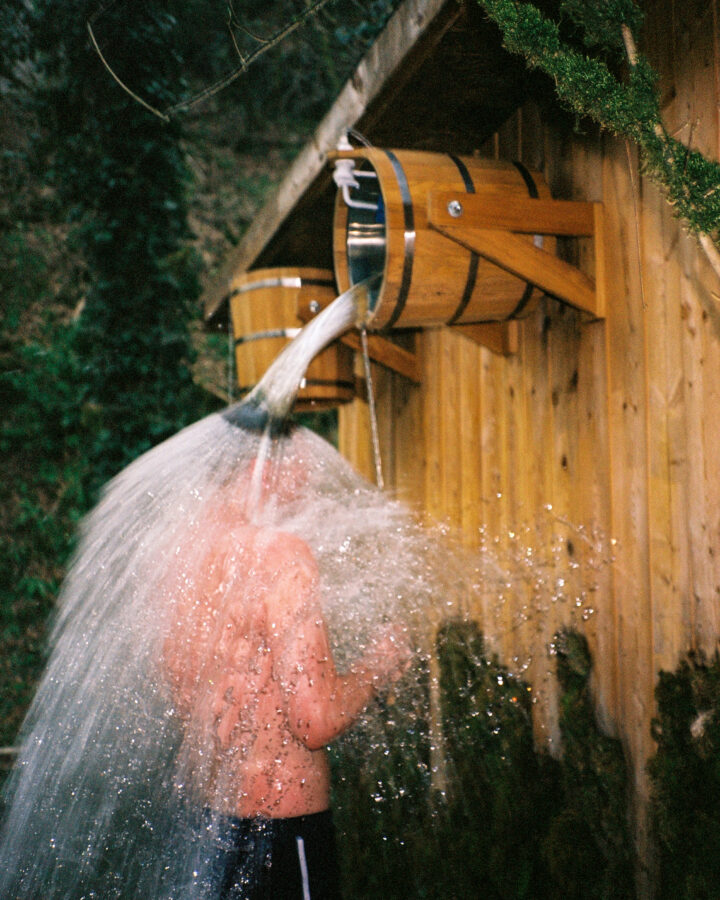The Benefits (and Risks) of Cold Plunge

Cold plunges may boost mood, metabolism, and immunity, but they’re not for everyone.
People have been inching their way into cold water for the promise of health and well-being for thousands of years. Hippocrates documented its use for pain relief, while ancient Romans did it to reduce fever.
It’s a national pastime in Nordic countries, where so-called “plunging” into frigid rivers or seas following stints in hot saunas is an elemental form of self-care during the long winters. And athletes worldwide have embraced cold water immersion (CWI), to help reduce muscle soreness and support recovery post-training.
In recent years, cold plunging has taken on a wellness fervor, hinting at an array of psycho-emotional and physical health benefits, including [lon-jev-i-tee]nounLiving a long life; influenced by genetics, environment, and lifestyle.Learn More. But is it true? Could regular cold-water immersion help you live better, happier, and longer?
First, what exactly is cold plunging?
Cold plunging refers to the practice of submerging your body (but not your head), in 39-59 degree F water, and staying there for at least a few minutes. People often begin with a few seconds and try to build up to 10 or more minutes.
It can be done in a bathtub with water chilled with ice cubes; in a body of water, like a lake, river, or ocean; or at a fitness center or at home, in a cold-plunge tank. Swimming in cold water also counts. Cold-showering has been found to also convey some benefits.
Submersion in cold water triggers what’s called “cold shock,” referring to swift physiological responses including a spike in heart rate and constriction of blood vessels, which leads to diminished circulation to your extremities and an increase in blood pressure. These abrupt changes are the main reasons cold plunging is not recommended for people with heart or vascular conditions.
But the body’s adaptation to this stress is what also causes the benefits, according to scientists. For example, one study found that people exposed to cold water three times a week for three months produced less [kawr-tuh-sawl]nounA hormone that helps manage stress, energy, and alertness.Learn More, indicating that repeated exposure increased their body’s [ri-zil-yuhns]nounThe ability to recover quickly from stress or setbacks.Learn More to environmental stressors.
The Research-Backed Health Benefits of Cold Plunges
First, is cold plunging good for you? Yes, when practiced safely, cold plunging has been linked to reduced stress, improved mood, better sleep, enhanced metabolic function, immune support, and even relief from menopause symptoms. However, people with cardiovascular or circulatory conditions should consult a doctor first.
What else does science say about cold plunging? There’s plenty of anecdotal evidence that cold water immersion uplevels, well, everything. Many people swear by the mental and emotional boons, literally jolting yourself into a different frame of mind. This is generally supported by research: Cold water exposure activates the sympathetic nervous system, resulting in a release of [en-dawr-finz]nounMood-boosting chemicals released by the brain during exercise or joy.Learn More and [doh-puh-meen]nounA neurotransmitter linked to motivation, pleasure, and learning.Learn More, which makes you feel better and may alleviate depressive symptoms.
For others, the steely dedication required to willingly put yourself in a physically unpleasant situation is part of the benefit, and a way to increase willpower and mastery over discomfort, as made famous by the Ice Man himself, Wim Hof.
Cold plunging also supports some aspects of physical well-being. It is well-documented for decreasing muscle soreness, which may lead to quicker performance recovery times. And there is some, albeit mixed evidence, that it may offer [an-tee-in-flam-uh-tawr-ee]adjectiveReducing inflammation, which contributes to better overall health.Learn More benefits.
Some studies have shown that cold water immersion may affect adipose tissue, increasing energy expenditure and possibly improving [in-suh-lin ri-zis-tuhns]nounA condition where cells in the muscles, fat, and liver don’t respond properly to insulin, leading to impaired insulin sensitivity and potentially prediabetes or type 2 diabetes.Learn More. Meanwhile, animal research has shown that cold shock provides neuroprotective benefits, which may slow neurodegenerative diseases.
But the research on the benefits of [kohld pluhnj]nounCold water immersion to enhance recovery and reduce inflammation.Learn More isn’t always clear. Most cited studies were done with small sample sizes, lacked diversity in age and gender, or looked at single immersions instead of regular exposure.
That said, reviews of the existing literature, including meta-analyses, and new, emerging research glimpses some promising physiological benefits for getting cold.
- May increase cellular resilience: A new small study from the University of Ottawa found that regular cold plunging may increase cellular resilience. The study followed 10 healthy young men as they underwent cold-plunge therapy in 57.2-degree water, for 7 consecutive days. Blood sampling showed that after the 7 days, the men’s cells showed significantly improved autophagic function, which refers to the way cells break down and recycle damaged or unnecessary components, and is a key marker of cellular health.
- May boost stress resilience and improve sleep: In a large-scale review and meta-analysis published on PLOS ONE earlier this year, Australian researchers found that CWT offers a delayed but positive impact on stress level, and that it may trigger the body’s anti-inflammatory response. The researchers also found that for some people, CWT may support better sleep, and that some users report slightly higher quality-of-life scores.
- May ease menopause symptoms: A British research survey of more than 1,000 women (mean age 49), found that those who swam in cold water every day year-round experienced significant relief from perimenopausal symptoms, including hot flashes, mood swings, anxiety and brain fog. They also reported better focus, mood, and sex drive; and had less disrupted sleep. Women who swam for 15-30 minutes during winter experienced greater benefits than women who swam for less than 5 minutes. But all cold water immersion offered some relief, prompting the researchers to conclude “cold water swimming does have menopause symptom-reducing properties.
- May offer immune benefits. A small 2024 study found that daily cold showers, over 90 days, appeared to enhance immunity by upregulating antibodies.
Are There Risks to Cold Plunging? What to Know Before You Try
The main risk of being in cold water is that it quickly draws heat away from the body, dropping your core temperature faster than your body can warm it, and leaving you at risk for hypothermia.
This is more common in open water than when cold-plunging in controlled environments. Yet submersion still causes rapid vasoconstriction, so it’s not advised for people with circulatory problems.
Anyone with a heart condition should also be cautious. Some research has suggested that prolonged cold water exposure can damage heart muscles.
And it may not always have the intended effect. For example, research on athletes who do resistance training, found evidence that it may interfere with the molecular processes that trigger muscle growth and strength.
So, with all that said, is cold plunging good for you?
If you are generally healthy, without circulatory or cardiac concerns, dipping a toe (or your whole body!) into the cold-plunge trend may be worth a try.
Science shows it can greatly benefit mood and support your body’s resistance to stress, which are both key factors for continued well-being and health as we age.
The information provided in this article is for educational and informational purposes only and is not intended as health, medical, or financial advice. Do not use this information to diagnose or treat any health condition. Always consult a qualified healthcare provider regarding any questions you may have about a medical condition or health objectives. Read our disclaimers.

